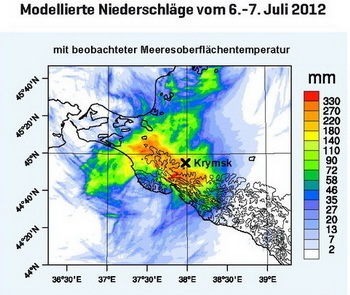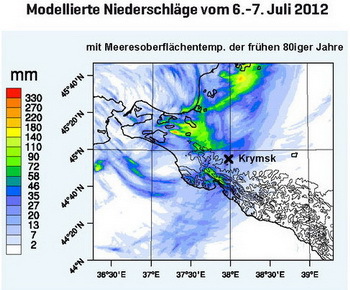15.07.2015 23:51
Kategorie: News
Kategorie: News
Increased Ocean Temperatures Lead to Higher Rainfall Extremes

|
|
model run using observed (actual) sea surface temperature. The black cross marks the town of Krymsk, the thin black lines are height contours with a distance of 150 metres. |
Led by the GEOMAR Helmholtz Centre for Ocean Research Kiel, the scientists studied the impact of this ocean warming on extreme precipitation.
It is no secret that temperatures on our planet are rising, as greenhouse gas emissions continue to increase. Nevertheless, the effects of global warming on the water cycle remain poorly understood, even as extreme summer storms become more severe as a result. In the coastal areas of warm seas, it was found that surface temperatures of the sea played a direct role in the intensity of summer storms. Since the 1980s, the Eastern Mediterranean and Black Sea have become warmer by about two degrees Celcius.
Citing the example of the heavy rains in July 2012 in the Black Sea town of Krymsk (Russia) which led to flash floods that killed 172 people, lead author Edmund Meredith said that the team used "a number of very-high-resolution simulations with an atmospheric model to investigate the impact of rising sea surface temperatures on the formation of intense convective storms, which are often associated with extreme rainfall."

|
|
model run using a colder SST representative of the early 1980s. The black cross marks the town of Krymsk, the thin black lines are height contours with a distance of 150 metres. |
Professor Douglas Maraun, leader of the study, added that they had been able to identify a very significant change, which indicated that the convective precipitation showed a strong, non-linear response to the temperature changes.
"Due to ocean warming, the lower atmosphere has become more unstable over the Black Sea and eastern Mediterranean. We therefore expect that events like those in Krymsk or Sochi will become more frequent in the future," said Maraun.
Website: www.geomar.de
Graphics by GEOMAR